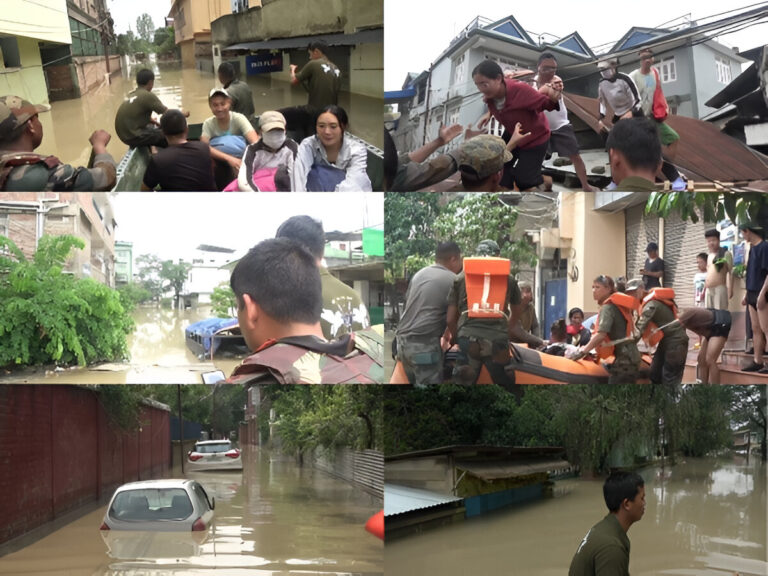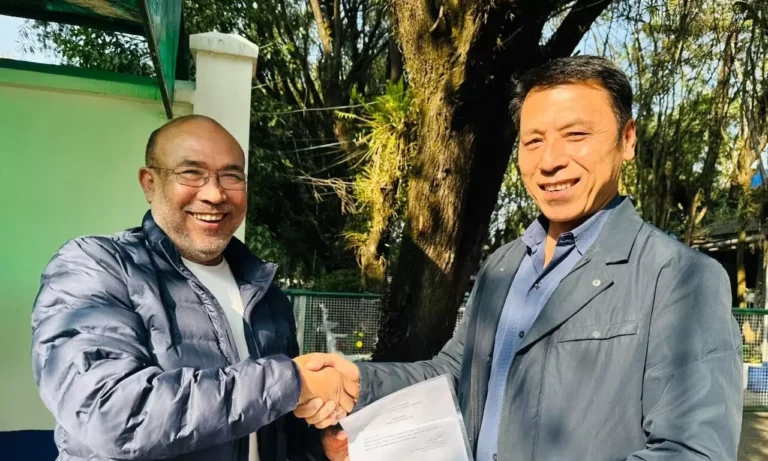Manipur HSLC 2025 Question Paper Leaked 30 Min Before Exam: A Closer Look at the Incident, Its Impact, and Future Implications
Introduction
Have you ever experienced that sinking feeling when you realize something isn’t quite right, especially on an important day? Imagine gearing up for your HSLC exam—the culmination of years of hard work—only to have the question paper leaked mere minutes before the exam starts. This isn’t a scene from a movie; it’s the startling reality that unfolded in Manipur during the HSLC 2025 examinations. In this comprehensive article, we’re going to explore every facet of this incident: what happened, why it matters, and how it might change the future of examinations in the region.
Background of the HSLC Exam in Manipur
The High School Leaving Certificate (HSLC) exam is more than just a test; it’s a milestone for students, a gateway to higher education, and a benchmark for academic success in Manipur. For years, this exam has been the final stepping stone for countless young minds, marking the transition from school to the next phase of their educational journey.
But with great significance comes great responsibility. The integrity of the HSLC exam is paramount to ensuring fairness and meritocracy in the education system. In a world where academic credibility is the cornerstone of future opportunities, any breach in examination security can have far-reaching consequences.
The Unfolding of the Incident
Picture this: It’s the day of the exam, nerves are running high, and students are bustling into exam centers with dreams in their eyes. Then, just 30 minutes before the exam, news breaks out—the HSLC question paper has been leaked. How could such a critical error occur at the last minute?
According to reports, the leak surfaced through digital channels, and within minutes, social media platforms were abuzz with discussions, speculations, and a sense of disbelief. The timing of the leak left authorities scrambling to contain the fallout. The rapid spread of the leaked paper not only disrupted the scheduled examination but also raised serious questions about the security protocols in place.
Immediate Reactions and Impact on Students
Imagine sitting in an exam hall, heart pounding, only to hear whispers about a leaked question paper. The impact on students is profound. For many, this exam represents years of preparation and hard work. The leak not only jeopardizes their chance to perform based on merit but also casts a shadow of doubt over the entire assessment process.
Students expressed a mix of confusion, anger, and anxiety. Some felt that their future prospects were being unfairly compromised, while others questioned the reliability of the system that was meant to safeguard their achievements. Parents, too, were thrown into turmoil, demanding immediate answers and assurances that the integrity of the exam would be restored.
The Underlying Causes: What Went Wrong?
Now, you might be wondering, “How could such a leak happen in this day and age?” The answer isn’t straightforward. Several factors may have contributed to this unfortunate event:
- Security Lapses:
In an era where digital technology governs almost every aspect of life, any weakness in cyber security can have disastrous consequences. It appears that there were vulnerabilities in the system that allowed unauthorized access to the exam paper. - Human Error or Malfeasance:
Was this an accidental leak or a deliberate act of sabotage? While investigations are still underway, some experts suggest that both human error and intentional misconduct could be at play. It’s like leaving the front door unlocked in a high-stakes situation—either a careless mistake or a targeted breach. - Digital Vulnerabilities:
With exams being increasingly digitized, the risk of cyber-attacks has never been higher. The leak might have been facilitated by a cyber breach, where a hacker exploited a loophole in the system, turning a secure process into a vulnerability.
Response from Authorities and Educational Bodies
The reaction from the authorities was swift and decisive. In the face of mounting criticism, examination boards and government officials launched an immediate investigation into the leak. The priority was clear: restore trust in the HSLC exam process and ensure that justice is served.
- Emergency Meetings and Rapid Response:
High-level meetings were convened to address the crisis, with officials coordinating efforts to secure all remaining examination materials. This rapid response, though commendable, was an acknowledgment that the breach had severely undermined the system’s integrity. - Investigation and Accountability:
Authorities have promised a thorough investigation into the incident. This includes tracking down the source of the leak and holding the responsible parties accountable. The message is clear: any breach of trust, especially in the realm of education, will not be tolerated. - Reassessing Security Protocols:
In the aftermath of the leak, there is a renewed focus on improving exam security. Plans for upgrading digital infrastructure, introducing stricter access controls, and even considering alternative methods of exam distribution are being discussed. Think of it as reinforcing the castle walls after a breach—stronger, smarter, and more resilient than ever before.
Impact on the Integrity of the Examination Process
The leaked question paper is not just a technical glitch; it strikes at the very heart of the educational system. When exam papers are compromised, the fairness of the entire examination is called into question.
For students who have prepared rigorously, this incident creates a sense of injustice. How can they compete on a level playing field when some have potentially gained access to the answers in advance? It’s like running a marathon where some participants get a head start—a scenario that undermines the core values of hard work and merit.
Broader Implications for the Education System
This incident opens up a broader discussion on the vulnerabilities within our education system. In today’s fast-paced digital age, where information flows instantaneously, safeguarding academic integrity is more challenging than ever.
Consider the following implications:
- Loss of Public Trust:
When the credibility of an exam is compromised, it shakes the foundation of trust between students, parents, and educators. This loss of trust can have long-lasting effects on the reputation of educational institutions. - Future Exam Reforms:
In response to the leak, there might be sweeping reforms in the way exams are conducted. This could include more robust digital security measures, the introduction of randomized question sets, and even a rethinking of the exam format itself. - Pressure on Educational Authorities:
This incident places immense pressure on educational authorities to not only address the current crisis but also to prevent similar occurrences in the future. The need for transparency, accountability, and rigorous oversight has never been more urgent.
Lessons Learned and the Way Forward
Every crisis offers an opportunity to learn and improve. The HSLC question paper leak, while deeply unfortunate, can serve as a catalyst for meaningful change in the examination system. Here are some potential lessons and measures that could be implemented:
- Upgrading Digital Security:
Investing in state-of-the-art cybersecurity solutions is no longer optional—it’s essential. Educational bodies must ensure that their digital platforms are robust, resilient, and capable of thwarting cyber threats. - Regular Audits and Penetration Testing:
Just as banks conduct regular security audits, examination boards should implement periodic checks and penetration tests to identify and address vulnerabilities before they can be exploited. - Strict Access Controls:
Limiting access to exam materials to only a few, trusted individuals can reduce the risk of leaks. Implementing multi-factor authentication and encrypted communication channels can further safeguard sensitive information. - Transparent Communication:
In times of crisis, clear and transparent communication with all stakeholders—students, parents, teachers, and the public—is crucial. This not only helps in managing the immediate fallout but also in rebuilding trust over time. - Alternative Examination Models:
Exploring alternative methods of examination, such as digital proctoring, randomized question papers, and even oral assessments, could help mitigate the risks associated with traditional paper-based exams.
Student and Parent Perspectives: A Closer Look
At the heart of this controversy are the students and their families. For many, the HSLC exam is a symbol of their academic journey, representing years of hard work and sacrifice. The leak has left them feeling betrayed and anxious about their future.
- Student Voices:
Many students have taken to social media and community forums to express their frustration. They question the fairness of an exam process that can be so easily compromised. One student remarked, “We put in our heart and soul into preparing for this exam. It feels like all our hard work has been undermined by a system that can’t protect our future.” - Parental Concerns:
Parents, too, are voicing their concerns. They worry not only about the immediate impact on their children’s performance but also about the long-term implications for the education system. “Our children deserve a fair chance to succeed. When the exam paper is leaked, it sends a message that integrity is no longer a priority,” one parent commented. - The Emotional Toll:
The psychological impact on students cannot be overstated. The stress and anxiety associated with preparing for a crucial exam are magnified when there is a perception of injustice. This can have lasting effects on a student’s confidence and overall academic performance.
Media Coverage and Public Discourse
The incident has garnered widespread media attention, sparking debates and discussions across various platforms. News outlets, social media influencers, and educational experts are all weighing in on the implications of the leak.
- Role of the Media:
The media’s role in covering this incident has been twofold. On one hand, it has served as a watchdog, highlighting the vulnerabilities in the system. On the other, it has provided a platform for students and parents to voice their concerns. This balanced coverage is crucial in driving accountability and prompting corrective action. - Public Discourse:
On social media, hashtags related to the HSLC leak have trended, with citizens demanding answers and reforms. The public discourse has centered around the need for transparency, improved security measures, and the restoration of faith in the education system. - Expert Opinions:
Education experts and cybersecurity specialists have offered insights into how such breaches can occur and what steps can be taken to prevent them. Their opinions underscore the necessity of adopting a multi-layered approach to exam security.
Long-Term Implications for the Education Sector
While the immediate focus is on addressing the fallout from the leak, it’s important to consider the long-term implications for the education sector in Manipur and beyond.
- Reforming Examination Protocols:
In light of this incident, there may be a push to overhaul traditional examination protocols. This could lead to a greater reliance on technology, more secure digital platforms, and innovative assessment methods that reduce the risk of similar breaches. - Building a Resilient System:
The current crisis presents an opportunity to build a more resilient examination system—one that is adaptive, secure, and capable of withstanding the challenges of the digital age. Such a system would not only prevent leaks but also enhance the overall quality of education. - Boosting Confidence in the System:
Ultimately, the goal is to restore and boost public confidence in the education system. By taking decisive action and implementing lasting reforms, authorities can demonstrate their commitment to fairness and integrity. This, in turn, will help rebuild the trust that is essential for the long-term success of students and educators alike.
A Call to Collective Action
The HSLC question paper leak is a wake-up call for all stakeholders involved in the education system. It’s a reminder that safeguarding academic integrity requires the collective effort of government agencies, educational institutions, cybersecurity experts, parents, and students. When we work together, we can transform challenges into opportunities for growth and improvement.
- For Authorities:
It’s time to invest in robust security measures and ensure that every loophole is closed. The future of our education system depends on proactive, transparent, and accountable governance. - For Educators:
Teachers and administrators must work to reassure students that their hard work is valued and that every step is being taken to secure their academic journey. Open dialogue and supportive initiatives can help mitigate the emotional toll of such incidents. - For Students and Parents:
Stay informed and involved. Your feedback and participation can drive meaningful reforms. By voicing concerns and supporting new initiatives, you play a crucial role in shaping a better, more secure educational landscape.
Conclusion: Paving the Way for a Transparent and Secure Future
The leak of the Manipur HSLC 2025 question paper just 30 minutes before the exam is a stark reminder of the vulnerabilities that exist in our digital and educational infrastructures. However, it also serves as a catalyst for change—a chance to reevaluate, reform, and rebuild a system that upholds fairness, integrity, and transparency. With concerted efforts from all stakeholders, we can ensure that such breaches are not repeated, paving the way for a future where every student can have confidence in the system designed to safeguard their dreams.
FAQs
- What exactly happened during the Manipur HSLC 2025 exam leak?
The question paper for the HSLC 2025 exam was leaked just 30 minutes before the scheduled start of the exam, leading to widespread disruption and immediate investigations by the authorities. - How did the leak impact the students and the overall exam process?
Students faced immense stress and uncertainty, while the integrity of the exam was questioned. Many students and parents expressed concerns about fairness, and the incident has sparked debates on the security of the examination process. - What measures are being considered to prevent future exam leaks?
Authorities are exploring enhanced digital security measures, regular audits, stricter access controls, and alternative examination models such as randomized question sets and digital proctoring to prevent similar incidents. - How has the community reacted to the leaked question paper incident?
The community, including students, parents, and educators, has reacted with a mix of shock, anger, and calls for immediate reforms. Social media platforms and public forums have been abuzz with discussions on improving exam security and restoring trust in the education system. - What are the long-term implications of this incident for the education system in Manipur?
This incident could lead to significant reforms in exam protocols, greater investment in cybersecurity, and a more resilient and transparent examination system, ultimately ensuring fairness and restoring public confidence in the educational process.



